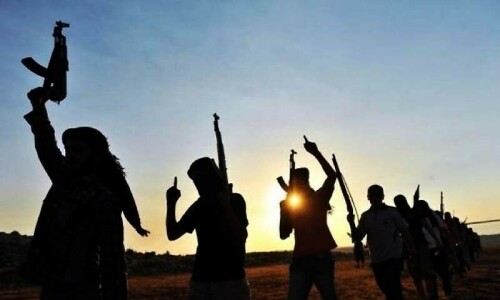WHILE the MQM’s call for army action to restore order in Karachi has been shot down by nearly all parties, the state is considering various other options. On Thursday, in a report submitted to the Supreme Court through the attorney general, the centre suggested bringing in the intelligence agencies to identify leaders of criminal outfits active in the city. It would be interesting to see what results this move produces, for if the bloodshed and death toll of the past few decades is anything to go by, the intelligence apparatus has failed miserably in keeping a check on the proliferation of weapons and militant groups in the metropolis. There can be little argument that Karachi needs the state’s attention. The question is whether the state’s responses — both on the law and order and political fronts — will result in a permanent solution to the all too frequent bouts of violence witnessed in the city.
There must be no rush to launch any new operations. Earlier state action in Karachi — that has included two major and countless minor security ‘operations’ — must be thoroughly reviewed; the reasons why these failed to produce lasting results must be probed. Such law enforcement actions have only produced temporary peace, with long-term safety and security eluding the residents of Karachi. New action can no longer afford to be cosmetic; if there are targeted operations they should follow a well-planned strategy. It is also essential that all political parties are on board and informed of what the intelligence agencies have to say. In this regard the federal interior minister has called for a ‘grand consensus’ amongst the politicians for a ‘targeted operation’ in the Sindh capital. It is important that such operations do not target any single party and turn into political witch-hunts. Already the MQM and ANP have cried foul over the arrest of more than 100 individuals in Karachi on Thursday, with both parties accusing the PPP of victimising their workers.
Just as important as properly planning action against militants in Karachi is the need for follow-up plans to ensure that violence does not recur. The authorities must have mechanisms in place that prevent militants of all stripes from rearming themselves after action has been taken, or else the vicious circle will continue. This requires cooperation between the intelligence agencies and the police. The onus is on the Sindh government to take action, while Islamabad must use the tools at its disposal to help the provincial administration establish lasting peace in Pakistan’s commercial heart.












































